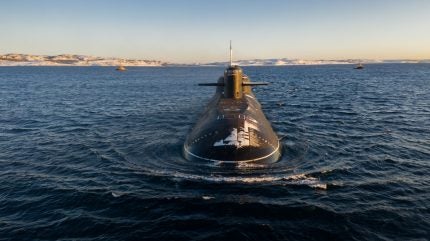
As military operations escalate in the Asia-Pacific region, countries like India, China, South Korea, and Australia are ramping up their investments in advanced submarine classes.
India’s Cabinet Committee on Security (CCS) has recently given the green light to the indigenous construction of two Project 75-Alpha nuclear attack submarines (SSNs), which is seen as a strategic move to upgrade and bolster the Indian Navy’s ability in carrying out anti-submarine warfare (ASW) roles in the Indian Ocean Region (IOR).

Discover B2B Marketing That Performs
Combine business intelligence and editorial excellence to reach engaged professionals across 36 leading media platforms.
GlobalData’s report, ‘Global Submarine Market Analysis and Forecast to 2033,’ says that India is projected to spend approximately $31.6bn on submarine procurement over the next ten years.
Of this investment, 30.5% will be allocated to the Project 75-Alpha SSNs. India plans to acquire a total of six SSNs under this programme, with an estimated value of $17bn.
The Project 75-Alpha acquisition programme is a collaboration between the Defence Research and Development Organisation, the Department of Atomic Energy, and the Indian Navy, aiming to develop a submarine with a 6,000-tonne displacement.
The submarines are expected to have a wide range of capabilities, including ASW, anti-surface warfare, and strike missions.

US Tariffs are shifting - will you react or anticipate?
Don’t let policy changes catch you off guard. Stay proactive with real-time data and expert analysis.
By GlobalDataAdditionally, the SSNs, in conjunction with the Indian Navy’s P-8I maritime patrol aircraft, are expected to improve the service’s capacity to detect and track Chinese submarines operating in the IOR.
The Project 75-Alpha SSNs are expected to enhance India’s power projection in the Indo-Pacific region and promote self-reliance in defence technology.
GlobalData Aerospace and Defence analyst Udayini Aakunoor said: “The acquisition of SSNs is a strategic move by India to modernise its Navy and tackle regional security challenges.
To be built at the Ship Building Centre located in Vishakhapatnam with participation from the domestic private sector, they are expected to boost the country’s autonomy in complex naval shipbuilding.”
The report also noted that the need for a reliable sea-based deterrent among nuclear-armed states is expected to boost submarine procurement from 2023 to 2033. As detection technologies advance, older submarine fleets are becoming less effective in terms of stealth. Consequently, many navies are launching initiatives to replace aging submarines, which will also impact demand during this period.





